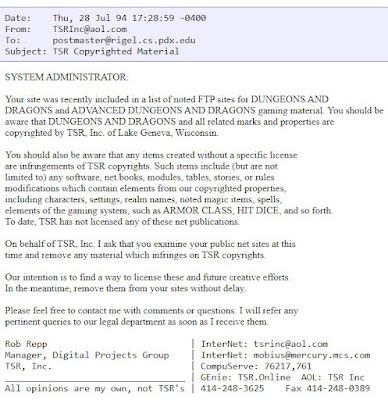Blast from the Past
As many readers of this blog undoubtedly already know, Wizards of the Coast is rumored to have plans to "de-authorize" version 1.0a of the Open Game License. Leaving aside the big questions of whether the rumors are true and whether or not WotC has the legal authority to initiate such a monumental change, I find myself reminded of this:
 That's the opening salvo in TSR's "war on the Internet" of the mid-1990s, when the company dubiously claimed that "any software, bet books, modules, tables, stories, or rules modifications which contain elements from our copyrighted properties, including characters, settings, realm names, noted magic items, spells, elements of the gaming system, such as ARMOR CLASS, HIT DICE, and so forth" were "infringements of TSR copyrights" unless they had been produced under license from TSR. Such belligerent and litigious behavior is what earned the company the nicknames T$R and They Sue Regularly.
That's the opening salvo in TSR's "war on the Internet" of the mid-1990s, when the company dubiously claimed that "any software, bet books, modules, tables, stories, or rules modifications which contain elements from our copyrighted properties, including characters, settings, realm names, noted magic items, spells, elements of the gaming system, such as ARMOR CLASS, HIT DICE, and so forth" were "infringements of TSR copyrights" unless they had been produced under license from TSR. Such belligerent and litigious behavior is what earned the company the nicknames T$R and They Sue Regularly. Ryan Dancey, the architect of the Open Game License, intended it, in part, to be a "laying down of arms" by Wizards of the Coast, an act of good faith to demonstrate that the then-new custodians of the world's first roleplaying game – this was 2000, remember – would not behave as TSR had done. It was also a way to safeguard the mechanics and ideas of D&D by "freeing" them, echoing Ted Johnstone's cri de coeur that "D&D is too important to leave to Gary Gygax." Dancey felt that D&D was too important to leave even to WotC, the company of which he was vice president at the time.
People more knowledgeable than I have a better handle on the legal and other ramifications of this possible turn of events. I highly recommend Rob Conley's series of posts on this topic, but many others have likewise written capably about it. Speaking personally, my concern is solely for the possible repercussions on the Old School Renaissance, a lot of whose foundational texts, such as OSRIC, Labyrinth Lord, and Swords & Wizardry , owe their existence to the OGL. If WotC is able to rescind even Version 1.0a of the OGL, despite previous assurances that this was impossible, it would send shockwaves throughout the hobby by overturning a state of affairs that has existed for more than two decades.
I suppose it's still possible that the leaked Version 1.1 of the OGL is merely a draft or even a trial balloon, but, even if that were true, I think this whole affair undermines the faith publishers have in the safe harbor that the OGL is supposed to provide them. Indeed, I would not be the least bit surprised if more than a few notable publishers decide to decouple their games from both the OGL and the D20 SRD. If so, we might see a return to the situation that existed in the '70s and '80s when publishers hid behind slightly altered terminology, such as Judges Guild's "hits to kill" instead of "hit points," in order to produce material broadly compatible with D&D without the need for a license (and royalty scheme) from TSR.
I will definitely have further thoughts on this matter in the coming days. If nothing else, I'll likely revisit the history of TSR's ham-fisted attempts to put the RPG genie back in the bottle, as well as take a look at just how much of D&D's purported intellectual property is obviously derivative of prior art. Interesting times!
Published on January 09, 2023 09:00
No comments have been added yet.
James Maliszewski's Blog
- James Maliszewski's profile
- 3 followers
James Maliszewski isn't a Goodreads Author
(yet),
but they
do have a blog,
so here are some recent posts imported from
their feed.



